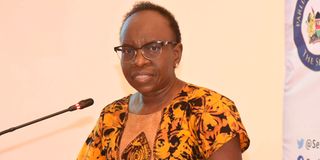Three state departments on spot for violating two-thirds gender rule

Auditor General Nancy Gathungu, during a meeting in Eldoret town, Uasin Gishu County on June 5, 2024. She has revealed systematic gender imbalance in various state departments.
What you need to know:
- The Auditor-General found three state departments violating the two-thirds gender rule with excessive male representation.
- Men occupy up to 75 percent of positions despite legal requirements for gender balance in recruitment and programs.
- Only 0.08 percent of the public sector budget goes to gender equality initiatives versus the recommended 1.5 percent.
The Auditor-General has put three departments on the spot for defying the two-thirds gender principle in human resource recruitment, training and incubation, and financing.
In the 2023/24 audit report of ministries, departments, and agencies, the departments of Water and Sanitation, Livestock Development, and Agriculture have been faulted for breaching the law on fair representation of women and men in human resources.
The State Department for Water and Sanitation was found to have violated Section B.22(2) of the Public Service Commission Human Resource Policies(2016), which requires that positions in the establishment not be filled by more than two-thirds of either gender. The department had over 60 percent of its positions occupied by men.
Of the 419 employees in the entity, 288 were men, representing 69 percent of the total workforce.
Policy
Two departments under the Ministry of Agriculture and Livestock Development have also failed to honour the policy on a gender-balanced civil service.
The State Department for Livestock Development's staff biodata revealed that women comprise 29 percent of the staff, while men make up 71 percent.
However, Livestock Development Permanent Secretary(PS) Jonathan Mueke maintained that they are compliant.
He shared figures indicating a total staff of 1,105, comprising 687 men (62 percent) and 418 women (38 percent).
The Auditor-General also found that the State Department for Agriculture failed to observe the rule when it recruited 432 youths for training, incubation, and financing.
Only 106 young women, equivalent to 25 percent, were accepted into the program, compared to 326 young men, translating to 75 percent.
Neither the Water and Sanitation PS nor his counterpart in Agriculture responded to queries on breaching the two-thirds gender rule and the measures for redress.
The PSs are mandated with developing and implementing an effective performance management system, including that on human resources.
Non-compliance with the two-thirds gender rule is not the only challenge facing the public service; inadequate financing of gender-related programs and initiatives is also a concern.
Gender equality
A report released in 2023 by the National Gender and Equality Commission assessing the status of gender equality and inclusion in the public sector highlighted a dire situation.
It indicated that in 2022/2023, public sector institutions allocated approximately Sh1.9 billion, equivalent to 0.08 percent of the total public sector budget, to gender equality initiatives.
The gender equality watchdog recommended that public sector institutions allocate at least 1.5 percent of their total annual budgets to gender mainstreaming.


